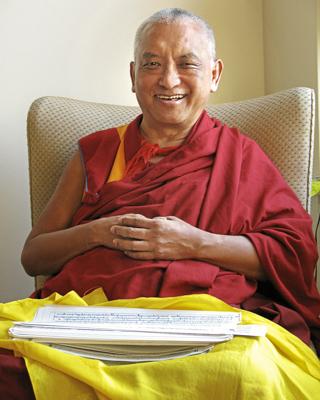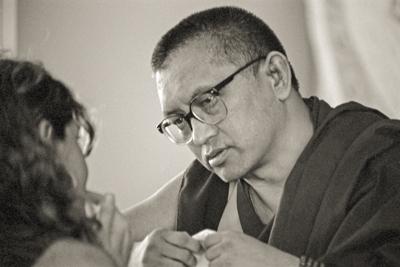Anger

Fed Up With Anger
An old student who was directing a new Dharma center received a timely phone call from Rinpoche one morning. She said, “I had become angry the previous evening, and was thinking about my anger, how happy I would be if I could never be angry again. There has never been a real reason for being angry at all, and the moments of anger keep returning. The next morning during my morning prayers, I was thinking about this and got very sad. I was praying to Lama Yeshe and Lama Zopa Rinpoche as I was crying, and asking them for help. The phone rang as I was starting my morning in the office. It was Rinpoche wanting to talk with me! His first question was: 'How was your night?' and I replied that I had had a bad night. I told him that I’d been thinking about my anger, and wanted to get rid of it. This seemed to please Rinpoche."

Very good. That’s very good. It’s very good if you get some aversion to your anger. It helps you to get free from samsara. If you develop aversion toward anger and toward all the delusions, it helps you to reach enlightenment quickly.
Without aversion toward delusions, nothing happens. In the West, the way of thinking is just the opposite to this. You think you have to have desire, you have to have anger, you have to have a strong ego, and so you build up a strong ego. You think it’s not possible to live without a strong ego. You think you need desire, anger, and all those delusions. This is how they talk in Western psychology, but it’s exactly the opposite.
By following the delusions, you only create negative karma. You are looking for happiness, but by following desire, anger, and all the other delusions, you will only experience suffering. And, it’s leading to rebirths in lower realms, as hell beings, hungry ghosts, or animals—or even as a human being, you experience much suffering, and you will be creating negative karma again and again by following the anger, the desire, and all the delusions all over again. That’s what they teach you in the West.
That’s why I say it’s good if you develop aversion to your anger. By having aversion toward anger, by having aversion toward desire, attachment, toward all the delusions, you will start to give up these delusions. You realize their harmfulness, and develop some aversion. The aversion toward the delusions is the only way to get free from them. When you realize their harmfulness, you do the practices to get free of them. And like this, you will get closer to higher rebirth, to liberation and to enlightenment. The aversion toward the delusions is leading you to enlightenment. Buddha Shakyamuni saw the harmfulness of delusions, developed aversion toward them, and reached enlightenment.
You can understand from this how good it is to realize the harmfulness of the delusions, and to develop aversion toward them. It’s a good sign. It means you are getting closer to enlightenment, and to becoming beneficial for all sentient beings.
Dealing with Anger
A student wrote to Rinpoche about his anger and its impact on other people. Rinpoche wrote the following letter to him.
My very dear Christian,
This is really an opportunity to practice the path of patience. The purpose of practicing patience is to have immediate peace and happiness within you. That moment when you don’t get angry means you don’t harm yourself, you don’t cause yourself unhappiness. When the mind becomes negative, it is like a bomb inside you.
Even if you are killed in a war by a bomb, it doesn’t necessarily mean you have to be born in the lower realms; you can be born in the upper realms. The bomb of anger is billions of times worse for you than any external bomb. When it arises, you create negative karma and throw yourself into the three lower realms, where you have to experience terrible suffering for an incredibly long time—for eons!
It is said by Shantideva in A Guide to the Bodhisattva Way of Life that the negative karma created by one second of anger causes us to experience the three lower realms for eons—one can’t be reborn in the realm of a happy transmigratory being. There is no need to mention the negative karma collected from infinite past lives.
Another quote is that the merit collected for one thousand years by making charity and offerings to Those Gone to Bliss and so forth is destroyed by one second of anger.
The first quote is saying how much anger causes you to suffer in the three lower realms. The second one is concerned with destroying eons of merit. The third disadvantage is that anger delays realizations, depending on who you get angry with and who you create the negative karma with. Then, anger also causes you to have an ugly body in your future lives. Practicing patience brings you a beautiful body in future lives.
In this way, anger is unbelievably harmful to oneself. Being angry just one time is so harmful, so you can imagine if it happens all day long or for weeks, months, or years. It is terrifying to think about. Just being angry one time brings so much suffering.
If you are angry you can’t really work with others. They get upset and leave, because they are so unhappy with you, and seeing this also makes you unhappy. Also, if you get angry, it makes others angry, and then this makes you angry again! You make yourself the target for others to get angry at you and harm you with harsh speech and dislike. If anger gets worse, it can even cause physical harm.
If you are patient, you don’t get angry at sentient beings. In that way, sentient beings only receive peace and happiness from you. Each time you stop being angry, by practicing patience, this becomes your most practical contribution to world peace. It brings so much peace and happiness to your own world, mind, and heart. For others, it brings peace and happiness, not only in this world, but for all living beings. If you are able to practice patience in this life, it will be much easier in future lives. By developing your mind in patience through the continuity of lives, you will bring happiness to all living beings.
Also, each time you come closer to completing the perfection of patience, it means you are getting closer to enlightenment, and much closer to bringing all sentient beings to enlightenment. So, you can see that each time you practice patience, there are long-term results. This is the power of the mind. Not only can you bring sentient beings temporary peace, but also full enlightenment.
At your work, you can change the staff if you don’t like them, but that will happen over and over, and it is difficult to bring your mind to peace. Whereas with patience, the mind is happy all the time. Your decisions at work are correct, but the problem is the way they are expressed—with harsh words and anger. These are extra and unnecessary; they create the problems. Of course, someone doing wrong needs to have it explained to them, but with compassion for them and with no negative feelings. You should use only kind words, even though you are saying what they did is wrong. And along with compassion we need wisdom. So, we who practice Buddhism have to live life with compassion and wisdom, and work with compassion and wisdom. So, of course, one has to develop compassion and wisdom.
You have a great opportunity to gain experience in patience. Each time you wake up, you must plan this—especially today! And be mindful when a circumstance occurs that provokes anger. If you don’t make a firm plan in the morning, you won’t remember the teachings when anger comes up.
Practicing patience and controlling anger become easier. The more you cherish others in daily life, the less anger you will have. You should think that each person you meet is the source of so much past happiness, and will be the source of so much future happiness, including the realizations of the path to enlightenment. So, respect others and practice kindness toward them, especially toward those who get angry with you.
So, to conclude: Practice patience, cherish others by remembering their kindness, respect others, and practice kindness to others. Then, everyone will love and support you and be your friend. They will be surprised and change their minds about you. They will be inspired when they see that your mind can change and develop. This shows the power of the mind, especially those with whom you got angry and who got angry with you.
Thank you very much.
With much love and prayers...
Practicing Patience
A student wrote to Rinpoche saying that he had been a monk for 21 years but there had been many interferences in his life. Rinpoche replied as follows.
It is extremely effective to practice patience. That is why you have been able to stay a monk for so many years. Otherwise, your life could be something else.
Anybody who experiences anger needs to practice patience. If you have a sickness, you need medicine. Like that, patience is needed. It is not a burden; it’s necessary. When you practice patience, anger becomes gradually more and more rare. Eventually, there is no anger, and then there is no enemy to destroy your merit. That is how you can achieve liberation. When there is no enemy to destroy your merit, you can have realizations. Realizations come, liberation comes, then enlightenment, and you will be able to liberate so many sentient beings from cyclic existence. That is the benefit. Each time you practice patience, the benefit is as vast as the sky. Think in the long term.
Practicing patience is the path of the bodhisattva. When you meet obstacles, be strong. Then the obstacles won’t last. If you are strong and practice compassion, patience, thought transformation, and emptiness, then obstacles don’t last.
More Talks on This Topic: Anger
See also:
- Understanding Anger, a talk by Lama Zopa Rinpoche in May, 1997.

